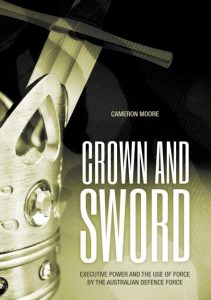Dr Cameron Moore was motivated to become a Legal Officer in the Defence Force after meeting Brigadier Bill Rolfe. Even though Bill had lost his legs in the Vietnam War, he wanted to continue serving his country in the army. Bill decided to change his career trajectory and enrolled in a law degree. After successfully completing his degree, he continued in the military as a legal officer.
Cameron was so inspired by Bill that he decided to become an army legal officer. Cameron was unable to do this as part of the army, but the navy welcomed him with open arms!
Since then, Cameron has entered academia, but he has never stopped working with the Australian military. He even took a reprieve from his academic career to complete some active service in Afghanistan a few years ago.
Never one to rest on his laurels, Cameron embarked on a PhD with the Australian National University (ANU). Cameron’s PhD was motivated by his realisation that there is no clear legal authority in terms of acts of war. The power to use force, which many would argue is one of the most extreme and serious powers available, is not clearly codified in Australian law. Instead, ancient powers of the Crown, also known as ‘Executive Powers’ are relied upon. Interestingly, these powers of the Crown go back to 1066- and people say the law is always changing!
If you would like to find out more about this disturbing, albeit fascinating situation, you will be pleased to know you can now purchase Cameron’s book which is entitled ‘The Crown and the Sword.’
The Abstract of the book is as follows:
‘The Australian Defence Force, together with military forces from a number of western democracies, have for some years been seeking out and killing Islamic militants in Iraq, Syria and Afghanistan, detaining asylum seekers for periods at sea or running the judicial systems of failed states. It has also been ready to conduct internal security operations at home. The domestic legal authority cited for this is often the poorly understood concept of executive power, which is power that derives from executive and not parliamentary authority. In an age of legality where parliamentary statutes govern action by public officials in the finest detail, it is striking that these extreme exercises of the use of force often rely upon an elusive legal basis. This book seeks to find the limits to the exercise of this extraordinary power.’
Congratulations on your new book Cameron!






Very interesting piece of research .I have often wondered about this particularly as the power of the executive has increased in recent years and keeps increasing.